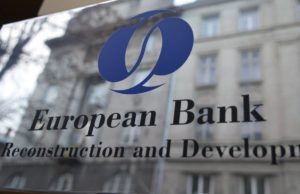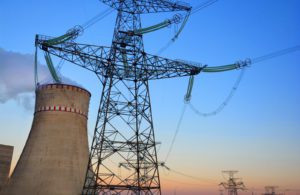
The Cabinet of Ministers of Ukraine has decided to approve the attraction of a loan in the amount of EUR 149 million by national energy company Ukrenergo for the project to modernize power lines from the European Bank for Reconstruction and Development (EBRD), the Finance Ministry of Ukraine reported on Thursday. According to the report of the ministry, the project foresees the replacement of transformer equipment and reconstruction of 12 substations with the installation of automated process management systems.
The project would allow the company to increase effectiveness and reliability of electricity transmission in western, northern, southern and central regions of Ukraine, modernize the key power transmission facilities, which is the condition for harmonization of the Ukrainian power grid with the European Network of Transmission System Operators for Electricity (ENTSO-E), the ministry said.

The European Bank for Reconstruction and Development (EBRD) has provided a loan of EUR 3 million to the Ukrainian woodworking company Zunami to finance the investment program, EBRD Senior Adviser for External Affairs Anton Usov has said.
“As a result of the project, the company will introduce new methods of waste management, which will allow reducing the volume of oak raw materials needed for production of lamella by 23%, or 3,000 tonnes per year,” he wrote on his Facebook page.
According to Usov, the loan funds will be supplemented by means of technical cooperation of the European Union in the amount of up to EUR 70,000 under the EU4Business program and a stimulating grant of more than $170,000 from the Global Environment Facility under the FINTECC program.
Zunami LLC (Volyn region) was founded in 2001. The company is engaged in a full cycle of wood processing. Its capacity is 2 million square meters per year. Zunami produces wooden flooring and solid biofuel – oak shavings pellets.
Wizz Air will raise frequency of flights from Lviv airport to Slovakia, Poland, Germany from Oct 20
KYIV. June 13 (Interfax-Ukraine) – The Hungarian low cost airline Wizz Air from October 20 will increase the frequency of flights from Lviv International Airport to Bratislava (Slovakia), Wroclaw, Gdansk (Poland), Berlin and Dortmund (Germany) for the winter of 2019/2020 season.
According to the airport’s Facebook page, in particular, such plans are linked to the popularity of these airline destinations from/to Lviv, the average monthly workload of which in 2019 is 83%.
Thus, the number of flights to Bratislava will increase from two to five flights a week. They will be performed on Mondays, Tuesdays, Wednesdays, Fridays, and Saturdays.
The number of flights to Wroclaw will rise from three to five flights. They will be performed on Tuesdays, Wednesdays, Thursdays, Saturdays, and Sundays.
Flights to Gdansk and Berlin will be carried out twice as often – four times a week (on Mondays, Wednesdays, Fridays, and Sundays).
The number of flights in the direction of Dortmund will grow from two to three per week (on Mondays, Wednesdays, and Fridays).

President of Ukraine Volodymyr Zelensky at a meeting with the delegation of the European Bank for Reconstruction and Development (EBRD), led by its president Suma Chakrabarti, has assured that bilateral cooperation will be intensified and will become more efficient. “We thank you for being here and thank you for being the largest investor in Ukraine. I want to assure that we will extend our cooperation,” Zelensky said at the meeting.
He stressed that the strategy of the EBRD is fully consistent with the priorities of Ukraine, and expressed conviction that Ukraine and the bank together can work more efficiently. Zelensky noted that the country appreciates cooperation with the international partners: the EBRD, the World Bank and the International Monetary Fund.
The president noted he had already met with the representatives of the IMF, at which Ukraine’s progress in fulfilling its obligations under the Stand-By Arrangement was noted. According to Zelensky, the parties discussed the issue of continuing cooperation.

The European Bank for Reconstruction and Development (EBRD) could provide Kyivteploenergo with up to EUR140 million in a loan to modernize the heat and power complex of the capital, Senior Adviser of the EBRD Anton Usov has said.
The parties under the ERBD Green Cities program signed an agreement on the preparation of financing.
It is expected that the result of this work will be a loan of up to EUR140 million, Usov said on Facebook.
As reported, Kyiv, following Lviv, became the second city in Ukraine, which joined the EBRD Green Cities project.
In the autumn of 2018, the EBRD approved the extension of this program with the possibility of allocating additional financing in the form of various loans with a total volume of up to EUR700 million. According to the program’s website, it currently has over EUR1 billion of confirmed funding, of which more than EUR250 million has already been invested.

The European Bank for Reconstruction and Development (EBRD) could organize a syndicated loan of EUR 80 million for state-owned Ukreximbank (Kyiv) to support renewable energy and energy efficiency private investments in Ukraine.
According to a posting on the bank’s website, EBRD will provide EUR 40 million from own account.
The provision of the loan is pending the approval of the EBRD Board on June 19, 2019.
Ukreximbank, a wholly owned state bank, was established in 1992. It ranked third among 77 banks in Ukraine in terms of total assets worth UAH 232.064 billion as of January 1, 2019, according to the National Bank of Ukraine (NBU).

The European Bank for Reconstruction and Development (EBRD) has recommended recommending the postponement of the wholesale electricity market opening in Ukraine, since the current state of groundwork for its implementation is not complete and the detailed regulatory and technical infrastructure required for a successful market is not yet in place.
According to a press release of the bank, on this basis, launching the new market on 1 July is likely to cause market malfunctioning and, therefore, be counterproductive to the interests of Ukrainian consumers and market participants.
“A postponement of the market opening should be, however, accompanied by a clear action plan of sequenced steps that would ensure its smooth introduction,” the bank said, adding that the EBRD is ready to offer all of its support in ensuring that this delay is as short as possible.
The EBRD said that the bank strongly endorse the introduction of a liberalized, competitive wholesale market in the power sector as the best route to deliver the highest possible efficiency in the generation of electricity.